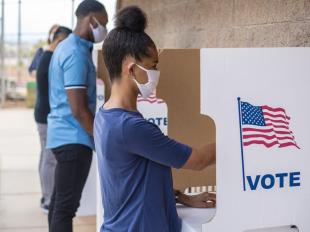Embracing a "Welcome" Philosophy to Creating and Sustaining Affordable, Quality Housing
2017 RWJF Culture of Health Prize winner Chelsea embraces a “welcome” philosophy where everyone is invited to call this small city in Massachusetts “home.” Community leader Grace Muwina still recalls the warm welcome Chelsea residents gave her family as recent arrivals from Zambia. Chelsea became her home and now she’s working to make sure the community stays affordable, connected, and accessible for all residents—newcomers and longtime residents.
Chelsea is the 26th most densely populated place in the United States, yet is the smallest city by land area in Massachusetts, situated just across the Mystic River from Boston. Nearly 40,000 people in this majority-Latino community live there and most of the land is zoned for industrial use, putting housing, particularly affordable homes, in high demand.
To expand affordable housing options, Chelsea community leaders are working hard to redevelop the land it has, starting with the Box District. Named for two former manufacturers that created cardboard boxes and box springs for mattresses, the area fell into disrepair once the factories closed. In 2000, the community succeeded in rezoning the area—about 10.5 acres—for residential use. The Neighborhood Developers (TND), a community development corporation that builds affordable housing and supports thriving neighborhoods, joined forces with others to build more than 200 homes. Half of these homes are affordable and half are market rate, built in partnership with a local developer transforming the Box District from an industrial site into thriving community where there’s a park and easily accessible public transit. TND is working in collaboration with several other organizations in the area to increase affordable housing and plans to build 400 more over the next seven years.
Through the CONNECT program—a partnership between TND, Bunker Hill Community College, Metro Housing Boston, MassHire, and Metro Credit Union—Chelsea is working to provide residents the support they need to stay in healthy homes and is enhancing the financial mobility and stability of low-income families by providing skill-building, job placement, and financial management.
“The basic theory is that housing impacts your health…if you don’t have a home it is harder to get healthy,” said Rafael Mares, TND’s executive director.
As residents, organizations, businesses, and hospitals come together to broaden access to affordable housing, the community is also equally committed to help prevent displacement. “We are experiencing two things at the same time, there is a need to improve the housing and infrastructure we have but at the same time there is already displacement going on,” said Mares. “Our challenge is to develop affordable housing in order to allow people to stay here and at the same time…work on improving the housing stock in the neighborhood.”
To support Chelsea residents who have worked hard to create a healthier city and to find and keep affordable, equitable housing, organizations have banded together to form Chelsea’s Anti-Displacement Roundtable. TND and GreenRoots, a community-based organization working for environmental justice and an improved quality of life, are part of the discussion trying to make a difference.
“We are convening this roundtable to support new affordable housing in the city while creating and implementing new policies and ordinances to better protect against displacement,” said Roseann Bongiovanni, executive director of GreenRoots. Potential solutions include proposing zoning changes that could include an anti-displacement zone for the waterfront neighborhoods and the creation of an office of housing equity to help long-term residents with challenges like rising rents, housing costs, and more. “If we are able to put in place, now, these policies, ordinances, and changes, we will be able to preserve and protect our community for the long term,” said Bongiovanni.

